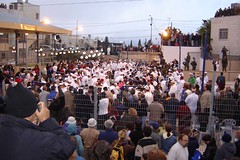Today my husband and I were walking along a beautiful Promenade. Israelis and Palestinians alike use this area. We often see people of both races there on our daily strolls. Today, it was delightful to see a precious Palestinian father walking along with his three sons. Two of his sons were older but there was one that was quite young. He was unsure on his feet. The father happily ran along behind him...a bit awkwardly...but joyfully keeping stride with his toddler. He was smiling as he chased the wee one along...with one hand in front of him to catch him from falling. It reminded me of our Heavenly Father...joyfully keeping up with us as we barrel along...ready to keep us from falling if we will allow Him. Pray for this Palestinian man, that he would come to know our Heavenly Father who is ready to keep us from falling...and able to right us when we do.
Posted by HL
"I (Jesus) am the good shepherd. The good shepherd lays down his life for the sheep." John 10:11
Monday, April 17, 2006
Wednesday, April 12, 2006
Samaritan Passover Sacrifice
We joined the Samaritan people yesterday for the sacrifice to begin Passover. There are only about 650 Samaritans left. Some of them live south of Tel Aviv in Holon and the rest still live on Mt Gerizim above Nabalus in the northern West Bank.
On the top of the mountain there are extensive ruins of a temple dating from the 6th century BC. It offers a beautiful view of Nabalus and surrounding area. We could just make out the area around the well where Jesus met the Samaritan woman.
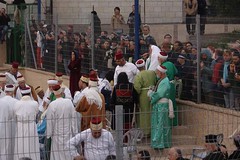 Around 6pm we gathered to watch the preparations for the sacrifice. Inside a fenced area the Samaritans gathered. Men in white; women in red. All the men had their heads covered – many wore a fez, many others wore baseball caps. We watched from bleachers; others crowded around the fence.
Around 6pm we gathered to watch the preparations for the sacrifice. Inside a fenced area the Samaritans gathered. Men in white; women in red. All the men had their heads covered – many wore a fez, many others wore baseball caps. We watched from bleachers; others crowded around the fence.
Most of the men gathered around a trench where the sheep were waiting. To one side were the elders; some of them dressed in bright robes. To the other side were the women although they mingled in with the men on occasion. When the ceremony started there was a welcoming of special guests in both Hebrew and Arabic. Then the men chanted for a long time – the two groups of men never quite together. It sounded a bit like Hebrew, but it may have been Aramaic. As the men chanted, the women talked. The louder the men chanted, the louder the women talked. (To be fair there were many of the men talking, too.)
Right at sunset, one of the elders chanted something (a prayer?) and the sheep were slaughtered. We couldn’t actually see that because of the crowd. As the blood drained into the trench, the men greeted each other with a kiss. One group in the corner kept up the chanting. Then they started butchering the sheep. Some of the men had poles about 4 meters long and they prepared to skewer the sheep. There were several pits in which fires had been built. The sheep were roasted on the poles in the pits. We left at 8 pm just as they were putting the sheep in the fires. We understood they would be eaten immediately.
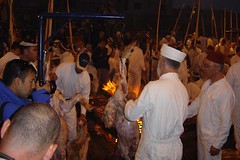
One observation that I made was that the sacrifice did not seem to be a high and holy moment. It was more of a carnival atmosphere. Of course, more that a thousand on-lookers didn’t help, but this was a large family gathering and they were glad to be together. This was a joyous occasion, but there did not seem to be much reflection on the meaning of the sacrifice.
Lord, may this people come to know the Lamb that was slain for all.
Jesus said to the woman “An hour is coming and now is, when the true worshippers will worship the Father in spirit and truth; for such people the Father seeks to be His worshippers. God is spirit and those who worship Him must worship in spirit and truth.” John 4:23-24.
I found additional information about Samaritan on the web.
On the top of the mountain there are extensive ruins of a temple dating from the 6th century BC. It offers a beautiful view of Nabalus and surrounding area. We could just make out the area around the well where Jesus met the Samaritan woman.
 Around 6pm we gathered to watch the preparations for the sacrifice. Inside a fenced area the Samaritans gathered. Men in white; women in red. All the men had their heads covered – many wore a fez, many others wore baseball caps. We watched from bleachers; others crowded around the fence.
Around 6pm we gathered to watch the preparations for the sacrifice. Inside a fenced area the Samaritans gathered. Men in white; women in red. All the men had their heads covered – many wore a fez, many others wore baseball caps. We watched from bleachers; others crowded around the fence.Most of the men gathered around a trench where the sheep were waiting. To one side were the elders; some of them dressed in bright robes. To the other side were the women although they mingled in with the men on occasion. When the ceremony started there was a welcoming of special guests in both Hebrew and Arabic. Then the men chanted for a long time – the two groups of men never quite together. It sounded a bit like Hebrew, but it may have been Aramaic. As the men chanted, the women talked. The louder the men chanted, the louder the women talked. (To be fair there were many of the men talking, too.)
Right at sunset, one of the elders chanted something (a prayer?) and the sheep were slaughtered. We couldn’t actually see that because of the crowd. As the blood drained into the trench, the men greeted each other with a kiss. One group in the corner kept up the chanting. Then they started butchering the sheep. Some of the men had poles about 4 meters long and they prepared to skewer the sheep. There were several pits in which fires had been built. The sheep were roasted on the poles in the pits. We left at 8 pm just as they were putting the sheep in the fires. We understood they would be eaten immediately.

One observation that I made was that the sacrifice did not seem to be a high and holy moment. It was more of a carnival atmosphere. Of course, more that a thousand on-lookers didn’t help, but this was a large family gathering and they were glad to be together. This was a joyous occasion, but there did not seem to be much reflection on the meaning of the sacrifice.
Lord, may this people come to know the Lamb that was slain for all.
Jesus said to the woman “An hour is coming and now is, when the true worshippers will worship the Father in spirit and truth; for such people the Father seeks to be His worshippers. God is spirit and those who worship Him must worship in spirit and truth.” John 4:23-24.
I found additional information about Samaritan on the web.
Monday, April 10, 2006
PL: Palm Sunday
I had the privilege of worshiping with a church in Bethlehem on Palm Sunday. It is always a joy to be with this congregation; their worship is so energetic and genuine. The pastor preached from Mark 11 – the event know as the Triumphal Entry.
Verse 13: Seeing at a distance a fig tree in leaf. He went over to see if perhaps He would find anything on it; and when He came to it He found nothing but leaves, for it was not the season for figs. He said to it: “May no one ever eat fruit from you again.”
Figs ripen in late summer. (And the figs in Jerusalem are delicious!) It always seemed unreasonable that Jesus expected to find fruit in the spring. The pastor asked the congregation what Jesus should have found on the tree. “Dafur” was the unanimous answer. It seemed like everybody knew about dafur but me. I learned later that dafur is a special Arabic word that means unripe or new figs. The dafur comes first and then the green leaves. Over the course of the summer, the dafur ripen into those delicious figs. According to the pastor, dafur taste even better than ripe figs. So even though it was early for ripe figs, there should have been dafur on the tree that Jesus and his disciples found in Jerusalem.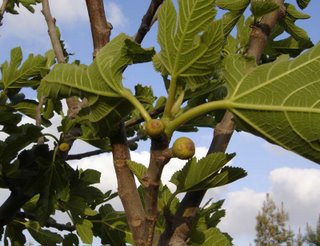
Of course, we want to have full-grown spiritual fruit in our lives. The time from green fruit to ripe can take longer than we’d like and it can’t be rushed. If we aren’t being the person that makes the green fruit possible and aren’t doing the things that allow it to ripen, we’ll never experience the ripe fruit. We shouldn’t worry about the fruit; it is the dafur that should concern us. If we are being and doing as God’s Word instructs us, the Holy Spirit will ripen our fruit. When it ripens it will be a pleasing fragrance and delicious just like the Jerusalem figs.
Verse 13: Seeing at a distance a fig tree in leaf. He went over to see if perhaps He would find anything on it; and when He came to it He found nothing but leaves, for it was not the season for figs. He said to it: “May no one ever eat fruit from you again.”
Figs ripen in late summer. (And the figs in Jerusalem are delicious!) It always seemed unreasonable that Jesus expected to find fruit in the spring. The pastor asked the congregation what Jesus should have found on the tree. “Dafur” was the unanimous answer. It seemed like everybody knew about dafur but me. I learned later that dafur is a special Arabic word that means unripe or new figs. The dafur comes first and then the green leaves. Over the course of the summer, the dafur ripen into those delicious figs. According to the pastor, dafur taste even better than ripe figs. So even though it was early for ripe figs, there should have been dafur on the tree that Jesus and his disciples found in Jerusalem.

Of course, we want to have full-grown spiritual fruit in our lives. The time from green fruit to ripe can take longer than we’d like and it can’t be rushed. If we aren’t being the person that makes the green fruit possible and aren’t doing the things that allow it to ripen, we’ll never experience the ripe fruit. We shouldn’t worry about the fruit; it is the dafur that should concern us. If we are being and doing as God’s Word instructs us, the Holy Spirit will ripen our fruit. When it ripens it will be a pleasing fragrance and delicious just like the Jerusalem figs.
Saturday, April 08, 2006
HL: A visit to Omri Camp
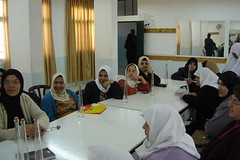
Today was a great example of using the resources available to our team. Our team on the West side of the Jordan River is small. We wrote an email to all the workers in our area asking if anyone would like to join us in a once a month project. We were pleased to get several who want to help the Pal team sporadically. We are so blessed ! Today we had four women who took a craft project into a women's center.
The ladies were already gathered for a lesson in the Kor'an. One of the ladies noted that the spirit seemed heavy when we entered. Her Arabic is very good and she noticed a few of the women quoting sayings (Kor'anic) that we don't normally hear on a daily basis. But the women were all very welcoming and delightful. Although we weren't able to verbally share our hearts. YOU know how many prayers were said during our time with them. We did a craft project that turned out really well and ate cake and drak juice together. We visited for a long while. We were invited to their homes. Palestinians are so loving and welcoming!!! We look forward to future visits in months to come. We especially look forward to when we can visit in their homes where we can actually share in a more natural setting.
Subscribe to:
Comments (Atom)
